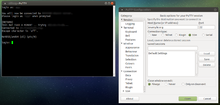This article has multiple issues. Please help improve it or discuss these issues on the talk page. (Learn how and when to remove these messages)
|
 A screenshot of PuTTY running under Ubuntu MATE | |
| Developer(s) | Simon Tatham |
|---|---|
| Initial release | January 8, 1999[1] |
| Stable release | 0.81[2] |
| Repository | |
| Written in | C |
| Operating system | Microsoft Windows, ReactOS, macOS, Linux |
| Type | Terminal emulator |
| License | MIT Licence[3] |
| Website | www |

PuTTY (/ˈpʌti/)[4] is a free and open-source terminal emulator, serial console and network file transfer application. It supports several network protocols, including SCP, SSH, Telnet, rlogin, and raw socket connection. It can also connect to a serial port. The name "PuTTY" has no official meaning.[5]
PuTTY was originally written for Microsoft Windows, but it has been ported to various other operating systems. Official ports are available for some Unix-like platforms, with work-in-progress ports to Classic Mac OS and macOS, and unofficial ports have been contributed to platforms such as Symbian,[6][7] Windows Mobile and Windows Phone.
PuTTY was written and is maintained primarily by Simon Tatham, a British programmer.
- ^ "git.tartarus.org Git - simon/putty.git/commit". git.tartarus.org. Archived from the original on 21 September 2021. Retrieved 31 August 2017.
- ^ Simon Tatham (15 April 2024). "PuTTY 0.81 is released". Retrieved 15 April 2024.
- ^ "PuTTY Licence". Retrieved 8 March 2021.
- ^ "PuTTY FAQ". www.chiark.greenend.org.uk.
- ^ "PuTTY FAQ".
[PuTTY is] the name of a popular SSH and Telnet client. Any other meaning is in the eye of the beholder. It's been rumoured that 'PuTTY' is the antonym of 'getty', or that it's the stuff that makes your Windows useful, or that it's a kind of plutonium Teletype. We couldn't possibly comment on such allegations.
- ^ "PuTTY for Symbian OS". s2putty.sourceforge.net.
- ^ "Forum Nokia Wiki – PuTTY for Symbian OS". Archived from the original on 16 July 2012.